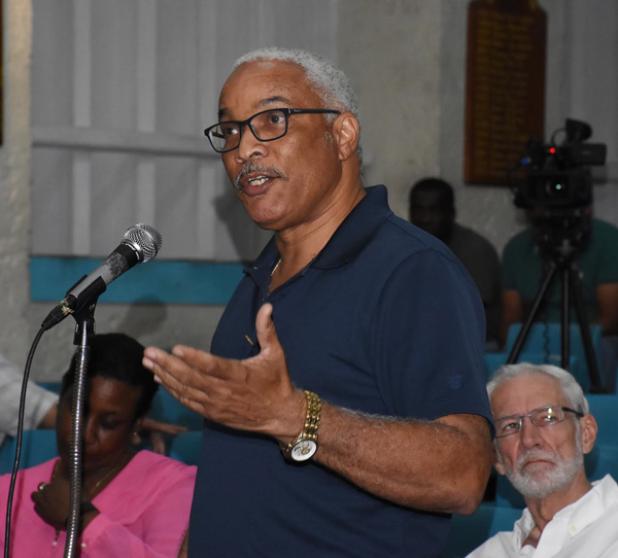
Deputy Chief Technical Officer (Operations), at the Ministry of Transport and Works (MTW), Philip Tudor, speaking about the challenges the Ministry is currently facing, at Wednesday night's Town Hall meeting held by the Barbados Association of Professional Engineers to discuss the issue of road maintenance in Barbados.
COSTLY POTHOLES
GOVERNMENT spends approximately three million dollars patching potholes every year.
This is according to the Deputy Chief Technical Officer (Operations) at the Ministry of Transport and Works (MTW), Philip Tudor, who declared that the figure he provided indicates that something needs to be done to allow the roads on the island to last longer.
Tudor was speaking at a recent Town Hall meeting hosted by the Barbados Association of Professional Engineers (BAPE), at the Combermere School, to discuss the issue of road maintenance in Barbados, where he openly discussed some of the challenges the Ministry is currently facing.
“On a monthly basis contractors supply about 100 tonnes of hot mix per week, equivalent to $55 250 dollars which is spent on pothole patching a week. And, on a yearly basis, we estimate that three million dollars is spent on the roads patching potholes alone.
“We are not talking about building new roads, or rehabilitation, we are talking about patching potholes only. Three million dollars is spent patching potholes. So I support the recommendation by the representatives from Arawak cement plant that something needs to be done that would allow the roads to last longer,” he said.
He explained that there are approximately 1 950 roads in Barbados, based on a survey conducted in 1994. That survey also showed that 59 per cent of the island’s roads were in fair to good condition, while “41 per cent of the roads were in poor to very poor conditions”.
“I would imagine that since 1994 things would have gotten worse,” he said.
Tudor, who noted that there are currently eight highly qualified engineers at MTW, explained that after 15 years roads start to oxidise due to exposure to constant sunlight.
“You may have a road that has never seen any sort of traffic on it, but within 15 years due to sunlight the road oxidises, cracking starts, water gets into the cracks, and you would see whiteness along the cracks, leaving a void underneath and that is the beginning of a pothole,” he explained.
Tudor indicated that the Ministry is not only faced with ageing infrastructure, but also equipment problems.
He said while the last time a patching truck was purchased was about 20 years ago, only three trucks are currently serving the island, “so it is not an easy thing to say we need to do this, we need to do that, we need to do the next.
“We recognise the fact that yes when the road is weeded the stuff is left there because we only have about four dump trucks to collect stuff in the whole of Barbados. We have been constantly requesting more money to buy equipment, it is only this last Estimates that we were told go ahead and order more equipment,” he pointed out.
A seemingly frustrated Tudor made it clear that the employees at the Ministry are anxious to work and give of their best, but noted that this can only be done when the needed resources become available.
“I am not here to make excuses for the Ministry but I am just telling you as it is. What we have done last year 2017, seeing that we did not have the equipment and personnel to repair the roads, we brought on board three contractors.
“There are three contractors working along with us patching potholes. What happens is that there are officers out there who travel the length and breadth of the island identifying potholes . . .,” he said.
“
There was a transport Levy back in 1991, but all of that now has gone into what you call the Consolidated Fund, so the Ministry no longer gets road taxes that are paid. I laugh sometimes when people say, ‘but I paid Road Tax’,” Tudor added.
(AH)
